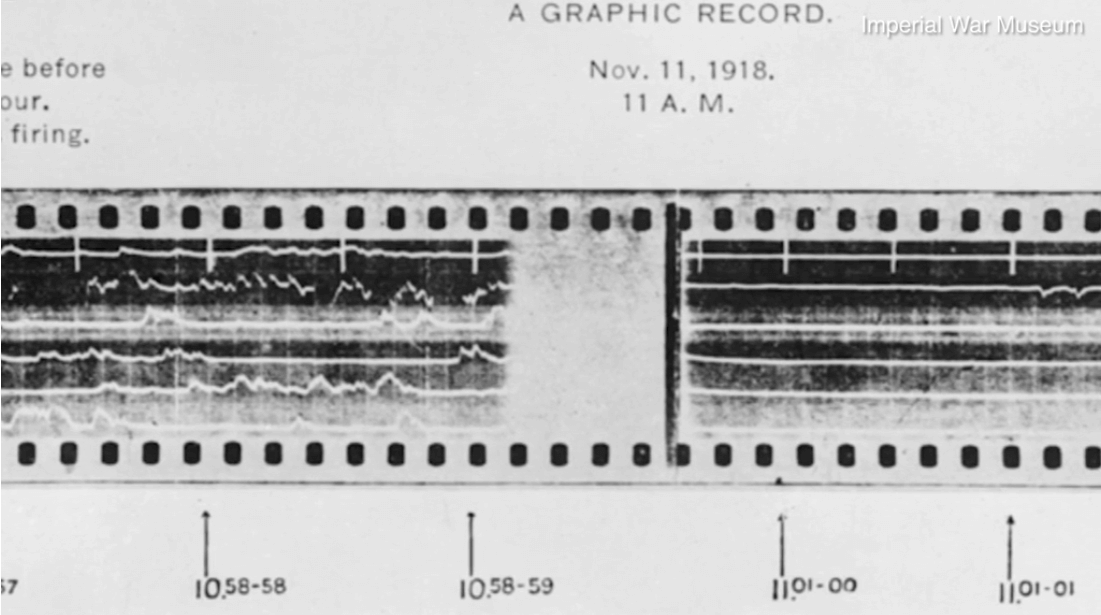Sermon, Church of the Holy Trinity, Toronto, November 11, 2018
Readings: 1 Kings 17:8–16; Hebrews 9:24–28; Mark 12:38–44
Hear this sermon as it was delivered:
On November 11, 1918, at 11 AM, the Great War officially ended and the guns fell silent.
That’s not just a figure of speech. It’s not just lofty poetry. Guns kept firing right until 11 o’clock. Artillery kept blasting away. More than 10,000 people died that morning.
Nobody was tape recording the sound; they didn’t have tape recorders. No one was at the front with a wax cylinder to record the sound phonographically. But oil drums in several locations were rigged up to transmit the vibrations for visual recording on a strip of film. They were used for triangulating the positions of enemy guns. They were still in use on the morning of November 11th, and a filmstrip has survived. It looks like a multi-line seismograph. The Imperial War Museum commissioned a reconstruction of the sound. You can hear different kinds of artillery blasting holes in the air more than once a second for a half a minute. And then they stop like a battalion of troops ordered to halt.
The war to end all wars was over.
It didn’t end all wars. We keep shooting at each other.
The armistice was signed at 5 o’clock on the morning of November 11th in a railroad car just outside Compeigne, to take effect 6 hours later, at 11 o’clock. The Allied commander, Maréchal Foch, met with the German delegation led by Mattias Erzberger. The Germans had instructions to take whatever terms they were offered. Germany was in turmoil; there were riots because of food shortages; it was obvious that they would not win the war.
Communication was not instantaneous. They couldn’t just call everyone at 5 and say “OK, stop fighting.” But they could have declared a truce to hold until the armistice took effect, and spread that order as quickly as possible. The Germans in the railroad car asked for that. Marshal Foch said no. He didn’t entirely trust the Germans, and he wanted to make sure they didn’t get anything they didn’t deserve. He wanted to make sure they had learned their lesson.
The news of the armistice travelled by radio to London and Paris and civilians were celebrating that morning. But as it was conveyed through the military command structure and across the front, different people had different reactions. Many, of course, wanted to stop fighting as soon as they heard an armistice had been signed. Many did. Many parts of the front were already quiet by 11 o’clock. But not all.
One of the American commanders, General John Pershing, did not back off. In his opinion, the terms of the armistice were soft on the Germans. He wanted to make sure they knew the Americans were serious about the armistice. He wanted to make sure the Germans learned their lesson. He pressed an offensive to cross the River Meuse—a river they would be able to cross with no problem as of 11 o’clock. He wanted to make sure that they got across before that, just to show that they could.
Not all of his subordinates followed the order with equal vigor or enthusiasm. But some did. Brigadier general William Nicholson told his regiment of soldiers from Baltimore, “There will be absolutely no let-up in the carrying out of the original plans until 11 o’clock.” You can imagine the soldiers weren’t all equally enthusiastic.
Marshal Foch’s refusal to declare an immediate truce lost his Allied command thousands of lives that morning. Pershing lost several thousand American lives in those six hours.
No.
Pershing had one life. As of 11 o’clock, he still had it. And would for another 30 years.
Marshal Foch had one life. As of 11 o’clock, he still had it. That same day, he was elected to the French Académie des sciences. Ten days later he was unanimously elected to the Académie française. He lived another decade. You can go to the wine store and buy wine made from grapes named in his honour: Maréchal Foch. They are not sour.
If the armistice hadn’t been signed that day, many thousands more would have died before it all ended. If a truce had been declared as of the signing, several thousands fewer would have died.
The generals could afford it, if they had to. They had all those lives at their command and they wanted to get maximum value for each one.
But of course those lives weren’t really theirs. Each soldier had one life, and one life only. And some didn’t get to keep it.
It was like if the rich temple-goers were taking money not out of their own purses but out of the widows’ purses. Or telling the widows they had to put money in for them.
Every last soldier was a widow putting all she owned into the treasury, even if the temple didn’t need her money in specific. Every last victim of a war was a person making one sacrifice for all time. Every last one was a life lived from birth through childhood and into adulthood, experiencing every moment in a string, as we do, until the string runs out. Is cut.
Such as Henry Gunther, from Baltimore, who had lived every moment of 23 years, 5 months, 5 days. Son of German immigrants. He had a comfortable bank job and a fiancée when he was drafted. He worked hard in the army and shipped out to Europe as his company’s supply sergeant.
He didn’t like the war. In one of his letters to a friend at home, he said life in the trenches is terrible, don’t get drafted. A military censor read the letter. Sergeant Gunther got busted down to Private Gunther. His fiancée dumped him. He started volunteering for dangerous assignments, perhaps to regain his honour.
On the morning of November 11th, 1918, he was in the regiment that Nicholson told to keep fighting. His unit was trying to take out a German machine gun post. At 10:44, a runner came and told them to stop fighting… in 16 minutes. “Hold the lines at the spot, and neither advance nor give way to the rear” was the order.
But just before 11, Gunther charged the Germans. His comrades yelled at him to stop. So did the Germans. They knew it was about to be over. But he kept coming at them and firing, so they fired a burst with their machine gun. And at 10:59 AM, Henry Gunther died on a dirt road in northern France.
According to the divisional record, “Almost as he fell, the gunfire died away and an appalling silence prevailed.”
Gunther seems to have given his life willingly. Which is to say, he had been put in a situation where it seemed to him like the thing he had to do. He certainly didn’t have to. He could have kept his life and lived many more years.
And the widow didn’t need to put all she had into the temple box. There were enough rich people who put in more than a hundred poor widows could, and still had plenty left over. That temple was not going to close the next day for the want of her two little coins.
But the widow gave all she had. And Henry Gunther gave all he had. Pershing and Foch gave thousands of lives, but Gunther gave more than either of them, because at the end they still had theirs, and he didn’t have his.
And every person who died in that war or because of that war gave all they had, some without wanting to, some believing that it was the right thing to do. For every one of them, the war stopped then. The guns fell silent in their world at the moment they gave it up. An appalling silence prevailed.
And yet the guns have not stopped. No sacrifice should be necessary to stop them, but no sacrifice is enough for us. Even though silence will prevail for each of us, one at a time, even though we don’t have to keep shooting at each other, we keep shooting at each other.
Siegfried Sassoon ended his poem “The Death Bed” with these words, these sounds in the air:
Light many lamps and gather round his bed.
Lend him your eyes, warm blood, and will to live.
Speak to him; rouse him; you may save him yet.
He’s young; he hated war; how should he die
When cruel old campaigners win safe through?But death replied: “I choose him.” So he went,
And there was silence in the summer night;
Silence and safety; and the veils of sleep.
Then, far away, the thudding of the guns.
© 2018 James Harbeck
seamus@harbeck.ca






